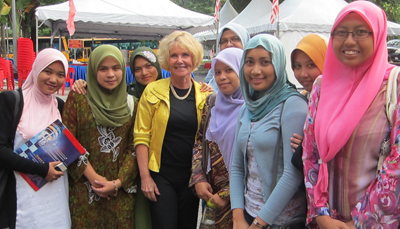Collaborating Around the World
This fall I traveled to Asia to meet with education leaders and share DO-IT practices to help students with disabilities transition from high school to college and careers and to help educators make technology and academic courses welcoming and accessible to all students.

In Singapore, I engaged with faculty and students in special education at the National Institute of Education, a postsecondary education organization that trains teachers. We compared practices in the U.S., Korea, Japan, and Singapore regarding people with disabilities and discussed how we might further collaborate as part of DO-IT's international efforts. I also shared information about some of our special efforts, including AccessComputing and AccessSTEM, National Science Foundation-funded projects developed to increase the participation of people with disabilities in computing fields and in science, technology, engineering, and mathematics (STEM). Next, I visited the IT Accessibility Center at the Society of Physically Disabled. I toured their assistive technology showroom and observed students participating in their program to train individuals with disabilities for technology-related jobs.
At the University of Malaya in Kuala Lumpur, I delivered the keynote address and several other presentations at its international workshop on special needs education. One presentation on accessibility features of mainstream computers was co-presented by Dr. Mamoru Iwabuchi, a representative from our DO-IT program at the University of Tokyo. In a dinner hosted by the University, Mamoru and I brainstormed ideas with leaders in Malaysia regarding how they can best begin DO-IT programs there and adjust activities in response to cultural issues and access approaches in Malaysia. These leaders have secured a grant from the Malaysian government to begin DO-IT activities there.
Learning how others around the world are addressing issues we care about continues to inform our practices at DO-IT. DO-IT is particularly attractive to the Asian countries we have worked with because our practices in using technology, addressing transition issues, and developing self-determination skills are flexible enough to adapt to their cultures.
Individuals and organizations are encouraged to replicate DO-IT practices worldwide. To get started, potential partners are encouraged to consider the following actions:
- Develop a support program for youth with disabilities that includes residential study on a college campus, in-person and online peer and mentor support, internships and other work-based learning, and access to computers and assistive technology.
- Promote the development of and use of technology for people with disabilities.
- Encourage the practice of universal design of instruction, physical spaces, technology, and services.
- Employ strategies to promote institutional change.
To continue to be informed of our international efforts to promote the development and use of technology and college and career success for people with disabilities, join DO-IT's international discussion list by sending an email to doit@uw.edu. For more information on international collaboration at the DO-IT Center, visit DO-IT International Initiative.